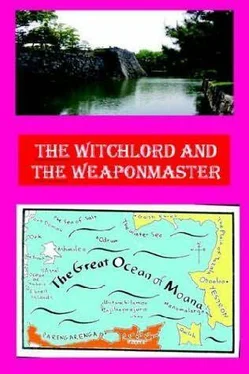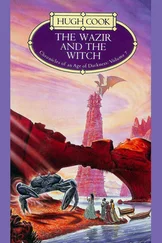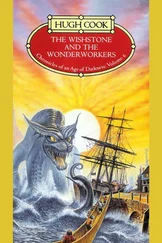Hugh Cook - The Witchlord and the Weaponmaster
Здесь есть возможность читать онлайн «Hugh Cook - The Witchlord and the Weaponmaster» весь текст электронной книги совершенно бесплатно (целиком полную версию без сокращений). В некоторых случаях можно слушать аудио, скачать через торрент в формате fb2 и присутствует краткое содержание. Жанр: Фэнтези, на английском языке. Описание произведения, (предисловие) а так же отзывы посетителей доступны на портале библиотеки ЛибКат.
- Название:The Witchlord and the Weaponmaster
- Автор:
- Жанр:
- Год:неизвестен
- ISBN:нет данных
- Рейтинг книги:5 / 5. Голосов: 1
-
Избранное:Добавить в избранное
- Отзывы:
-
Ваша оценка:
- 100
- 1
- 2
- 3
- 4
- 5
The Witchlord and the Weaponmaster: краткое содержание, описание и аннотация
Предлагаем к чтению аннотацию, описание, краткое содержание или предисловие (зависит от того, что написал сам автор книги «The Witchlord and the Weaponmaster»). Если вы не нашли необходимую информацию о книге — напишите в комментариях, мы постараемся отыскать её.
The Witchlord and the Weaponmaster — читать онлайн бесплатно полную книгу (весь текст) целиком
Ниже представлен текст книги, разбитый по страницам. Система сохранения места последней прочитанной страницы, позволяет с удобством читать онлайн бесплатно книгу «The Witchlord and the Weaponmaster», без необходимости каждый раз заново искать на чём Вы остановились. Поставьте закладку, и сможете в любой момент перейти на страницу, на которой закончили чтение.
Интервал:
Закладка:
And what would you do – to take case more tractable than some of the traumas detailed above – if your friend were to come to you in panic, declaring a leech to have penetrated his privacy by means of the eye of his male organ? (And if you think this a most unlikely contingency, then know that just such a disaster is said to have befallen one of the heroes who quested with the Rovac warrior Morgan Hearst, when that worthy was in hot pursuit of the renegade wizard Heenmor).
And (to pursue the subject of the tenderness of the male organ a little further) have you heard of the jilifish? It is a fish of certain of the equatorial jungles, a fish which will swim up the flow of a man's urine, then erect its sharpest fin inside his organ of generation. How would you know a river to be infested with such a fish? And how would you guard yourself against its onslaught?
It is obvious that you will know a river to be jilifish- infested when your best friend screams in white-hot agony while taking a piss (assuming that he has not been lately to a brothel, in which case his pain may have an alternative cause). And it is obvious likewise that you can best guard yourself against the jilifish by refraining from pissing into rivers, and, further, by making sure that the stream of your cautious micturation passes through a filter fine enough to deny all fishes a route of ardent ascent.
As for the other questions – why, war will certainly ask them, and if war is your destiny then you had better know the answers.
Really, considering the grievous contingencies of armed adventuring, it can soberly be stated that no person should be allowed to take up arms without first enduring a full seven years of training in the repair and preservation of flesh and blood, of skin and bone, and of the ever-vulnerable male organ in particular.
But the more common expedient is to teach young men the mere use of weapons, so that, when placed in the presence of agony, they can but gape – and watch the wounded die. This is the common experience of war; though it is little reported, for it is human to forget, and those who cannot forget it most typically say nothing. So remember, when you find yourself in the presence of a happily loquacious old soldier, that he is but a victim of selective amnesia – a fact which may amply be proved by asking him to narrate for you the manner of the death of those of his friends who took the longest to die.
Being a very average young man in many respects, Guest Gulkan did just what most soldiers do in the face of those wounded and dying: he paused and he pitied, then he went on and forgot.
And that was the end of the matter.
And if you are surprised to find in these pages so much war in combination with so little suffering, why, then know well the reason. This is Guest Gulkan's story, the biography of a warrior, and a warrior of the Yarglat at that. And your every accomplished warrior is necessarily an amnesiac – and, more, neglects to see that which is not useful for his purposes.
It is said by the tender that any tale of war should concentrate on its suffering, for the tender-minded hold such suffering to be the ruling reality of war. In this they are in error; and, focusing on the dead and dying, they misunderstand that which they deprecate. Misunderstanding the dynamics of war, they cannot thereafter hope to alter those dynamics.
If history has any moral mission, then it is this: to render to the fullest the complexities and uncertainties of the living human reality which we endure. For it is we ourselves whom we seek to understand when we read in the pages of history – we, the human people, wizards and warriors, wonderworkers and washerwomen.
If we study the affairs of puppets and poppets then we will be well-equipped for life in a doll's house; but the world is not so amiably constituted, and attempts to treat it as if it were lead commonly to disaster.
Let us then stage no moral charades with puppets and poppets.
For if we do, then we delude ourselves; and, surely, to choose to be wilfully blind as to our own nature is the greatest of crimes, for without self-knowledge there can be no governance of the self by the self.
Yes, and there are those who deny this, and say that it is sufficient to yield in faith to the diktats of some deity such as Zoz the Ancestral or similar. In such faith, they are prepared to burn all history, blaming the page for the battle, the court record for the crime. The reason for their willed ignorance is simple: self-knowledge and self-awareness are painful, so the weak and the inadequate customarily prefer the numb oblivion of the slavery of unquestioning faith.
In defiance of such wilful ignorance, this history speaks, holding truth to be the highest virtue. For only through an acknowledgement of the living realities of our world and our own existence can we attain self-knowledge and autonomous adulthood.
And only by acknowledging the living realities of war can we hope to understand the persistence of war, which continues to blight our world despite the best-hearted efforts of those tender-minded moralists who would have us believe that war is one mass of conscious suffering, and that every warrior is a victim.
This book is a history of the warrior's living reality. And the truth of the warrior is ambition combined with amnesia, selective vision supplemented by selective memory, and the belief that victory is the validation of all suffering. Therefore, believing truth to be the highest virtue, we will not distort the record with moral charades of painful remorse, charades incompatible with the truth; but, rather, will note the plain fact, which is that Guest Gulkan swiftly forgot the dying washerwoman as he hastened up the stairs toward the Hall of Time.
In his barefoot panting, the Weaponmaster gave no further thought to the sorrows of war or the suffering of the injured.
Rather, he was seized by an electric excitement. His eyes glittered as if frenzied by a lightning bolt; his sword trembled in his battle-ready hand; and his thoughts were focused entirely on his long-delayed but now-inevitable confrontation with Icaria Scaria Iva-Italis, Demon By Appointment to the Great God Jocasta.
Chapter Twenty-Two
Sod: Banker Sod, aka Governor Sod, aka Lord Sod: a merchant banker graced with the pale skin, the yellow head-hair and the thick white body hair, the golden eyes and the jet-black fingernails so typical of the iceman breed. His daughter is Damsel, she who so recently seduced and betrayed the Weaponmaster.
So Guest Gulkan ventured up the last of the stairs and entered into the Hall of Time, where the gutter-gubber nightlight of oil lanterns spilt a garblage of shadows across skull-pattern tiles. Many of those nightlamps had flubbered their last, and by expiry had left great gouts of shadow sprawled across that cavernous chamber.
Cavernous? Yes, the word was exact, not capricious or spuriously decorative. Carved as it was in the living rock of the mainrock Pinnacle, and breached as it was by the venting draughts of aerial ice which shuddered by histle and scree through the slits in its windows, this gloom-gaping barrow was much more of a cave than a hall.
At the far end of that oval engapement, a full hundred paces from the entrance where Guest Gulkan stood, something glowed cold and green.
The demon.
The night of their first encounter was so long ago in the past, so heavily overlaid by memories of battle and disaster, that
Guest from time to time had been half-convinced that the whole thing had been no more than a figment of his fevered imagination.
After all, he had been ill at the time, had he not? Grievously ill – near dead from influenza, and many of his erstwhile companions literally dead.
So, while the Weaponmaster had rehearsed his memories a thousand times, he had half-suspected their vivid solidity to have been no more than that spurious hyper-realism which characterizes the most gripping of sweet-dreams and nightmare. In its very nature, that first encounter had been half sweet-dream, half threat. For the demon had promised to make Guest a wizard, had it not? That was sweet: the prospect of being able to amplify his swordstroke with powers equal to those of a Zozimus or a Pitilkin.
Читать дальшеИнтервал:
Закладка:
Похожие книги на «The Witchlord and the Weaponmaster»
Представляем Вашему вниманию похожие книги на «The Witchlord and the Weaponmaster» списком для выбора. Мы отобрали схожую по названию и смыслу литературу в надежде предоставить читателям больше вариантов отыскать новые, интересные, ещё непрочитанные произведения.
Обсуждение, отзывы о книге «The Witchlord and the Weaponmaster» и просто собственные мнения читателей. Оставьте ваши комментарии, напишите, что Вы думаете о произведении, его смысле или главных героях. Укажите что конкретно понравилось, а что нет, и почему Вы так считаете.












